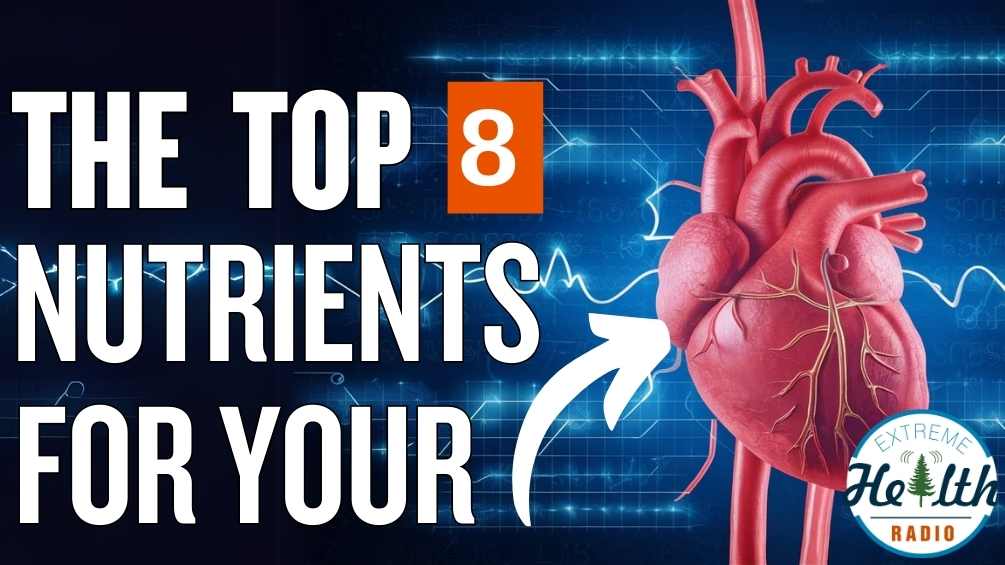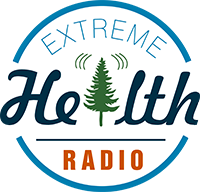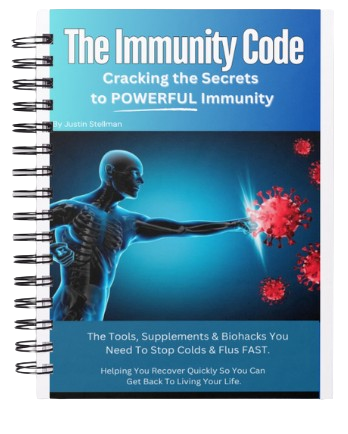
Taking supplements for cardiovascular health is a good thing but it’s not the only thing you can do to improve your heart health.
We’ll dive into all the things you can do for your cardiovascular health later in this article.
I want you to avoid thinking like everybody else who has been indoctrinated by the medical industry. They reduce the body to machinery where they can swap out parts (organs) and take drugs to get rid of symptoms, rather than cure the cause.
If you have heart disease in your family or are generally concerned with your cardiovascular health, I’m going to share some really great supplements you can start taking immediately.
But that doesn’t mean, you shouldn’t avoid what’s causing poor heart health. Research has shown time and time again that nnEMF (this includes blue light), polyunsaturated fatty acids and processed foods are some of the main triggers for heart disease.
I would highly recommend getting rid of those from your diet and upgrading your lifestyle and environment.
On top of taking these supplements for cardiovascular health, I would research blood donation, daily walks, regular sauna use (here’s the one we use) along with drinking more clean water daily.
To take it a step further, you could install red lights inside your home (or wear blue blocking glasses if your family isn’t on board), Iris Tech on your computer, and turn your WiFi off at night. I’ll post a show right below this that goes into great detail about this issue.
nnEMF in the form of Wi-Fi creates oxidative stress (massive electron loss) on cell membranes. One of the most important functions of cell membranes is to regulate what gets allowed inside the cell (to get near the thousands of mitochondria that reside intracellularly).
In the presence of radiation cell membranes become more permeable, which allow calcium, iron, heavy metals, parasites (see cleanse) and other toxins to get inside the cell where they cause damage, furthering inflammation.
This happens to every cell in your body including heart cells.
So at the very least, I implore you to turn off your WiFi (Wi-Fry) at night before you go to sleep.
Less oxidation while you sleep, means better recovery and robust health.
These are easy things you can do in addition to taking supplements to improve your cardiovascular health.
If I had heart issues I wouldn’t rely on taking the supplements while still consuming a high PUFA diet or eating processed foods. You cannot out-supplement a bad environment or a poor lifestyle.
With that in mind, I’m going to share my top eight supplements for cardiovascular health that target the most common cardiovascular health concerns which are…
- Plaquing of the arteries
- Blood pressure and blood circulation
- Heart function and beat timing
- Cardiovascular inflammation and oxidative stress
If you could remove these 4 issues, there would be very little heart attacks or death from cardiovascular issues.
So let’s tackle them….
8 Supplements For Cardiovascular Health
Reduce Arterial Plaque
1. Vitamin K2
Vitamin K2—a neglected player in cardiovascular health
A study titled “Vitamin K2—a neglected player in cardiovascular health” was published in 2021 by researchers from various institutions. This peer-reviewed article discusses the potential benefits of increased vitamin K2 intake, suggesting it may reduce arterial stiffness and slow the progression of vascular calcification. However, the study also notes that while animal studies have shown promising results, human studies remain inconclusive. – Source
Vitamin K2 and D in Patients With Aortic Valve Calcification
Another study, “Vitamin K2 and D in Patients With Aortic Valve Calcification,” was conducted at Odense University Hospital in Denmark and published in 2022. This randomized, double-blind, placebo-controlled trial involved older men with aortic valve calcification. The study concluded that vitamin K2 and D supplementation did not significantly slow the progression of aortic valve calcification. – Source
2. Nattokinase
Effective Management of Atherosclerosis Progress and Hyperlipidemia with Nattokinase: A Clinical Study with 1,062 Participants
In 2022, a clinical study titled “Effective Management of Atherosclerosis Progress and Hyperlipidemia with Nattokinase: A Clinical Study with 1,062 Participants” was conducted by researchers from various institutions. This study involved human participants over 12 months and found that a higher dose of nattokinase (10,800 FU/day) was effective in managing atherosclerosis progression and hyperlipidemia, with no adverse effects reported. – Source
Natto Consumption Suppresses Atherosclerotic Plaque Progression through Changes in Intestinal Microflora,
Another study, “Natto Consumption Suppresses Atherosclerotic Plaque Progression through Changes in Intestinal Microflora,” was conducted by the University of Tsukuba in Japan and published in 2023. This animal study demonstrated that natto consumption led to changes in gut microbiota, which in turn suppressed the progression of atherosclerotic plaques. – Source
Improve Blood Circulation & Pressure
3. Magnesium
Magnesium supplementation for 12 months did not slow the progression of vascular calcification in CKD, despite a significant increase in plasma magnesium
A study titled “Magnesium supplementation for 12 months did not slow the progression of vascular calcification in CKD, despite a significant increase in plasma magnesium” was conducted across multiple institutions and published in 2023. This randomized, double-blind, placebo-controlled clinical trial involved human participants with chronic kidney disease (CKD) and found that while magnesium supplementation significantly increased plasma magnesium levels, it did not slow vascular calcification progression. Additionally, the study noted a higher incidence of serious adverse events in the magnesium-treated group, raising concerns about its long-term use in CKD patients. – Source
Dietary magnesium intake and the risk of cardiovascular disease, type 2 diabetes, and all-cause mortality: a dose-response meta-analysis of prospective cohort studies
Another study titled “Dietary magnesium intake and the risk of cardiovascular disease, type 2 diabetes, and all-cause mortality: a dose-response meta-analysis of prospective cohort studies” was conducted by researchers from various institutions and published in 2016. This peer-reviewed meta-analysis of prospective cohort studies on human populations found that increasing dietary magnesium intake was associated with a reduced risk of stroke, heart failure, diabetes, and all-cause mortality, although no significant association was observed with coronary heart disease or total cardiovascular disease. The study concluded that higher magnesium intake may be beneficial for overall cardiovascular and metabolic health, but further research is needed to clarify its role in heart disease prevention. – Source
4. Coenzyme Q10 (CoQ10)
Dose-Response Effect of Coenzyme Q10 Supplementation on Blood Pressure in Patients with Cardiometabolic Diseases
A meta-analysis titled “Dose-Response Effect of Coenzyme Q10 Supplementation on Blood Pressure in Patients with Cardiometabolic Diseases” was published in 2023. This study found that CoQ10 supplementation significantly reduced systolic blood pressure, especially in patients with diabetes and dyslipidemia, with an optimal dose of 100–200 mg/day. – Source
Coenzyme Q10 in the treatment of hypertension: a meta-analysis of the clinical trials
A meta-analysis titled “Coenzyme Q10 in the treatment of hypertension: a meta-analysis of the clinical trials” was published in 2007. This analysis reviewed multiple clinical trials and found that CoQ10 supplementation has the potential to lower systolic blood pressure by up to 17 mm Hg and diastolic blood pressure by up to 10 mm Hg without significant side effects. The researchers concluded that CoQ10 could be a beneficial adjunctive treatment for patients with hypertension. – Source
Randomized, double-blind, placebo-controlled trial of coenzyme Q10 in isolated systolic hypertension
Another study, “Randomized, double-blind, placebo-controlled trial of coenzyme Q10 in isolated systolic hypertension,” was conducted at the University of Western Australia and published in 2002. This 12-week trial involved human participants with isolated systolic hypertension and found that CoQ10 supplementation resulted in a significant reduction in systolic blood pressure by an average of 17.8 mm Hg without causing orthostatic hypotension. The study concluded that CoQ10 is a safe and effective treatment for isolated systolic hypertension. – Source
Support Heart Muscle Function
5. Taurine
Taurine: A ‘Very Essential’ Amino Acid
A review titled “Taurine: A ‘Very Essential’ Amino Acid” was published by the National Center for Biotechnology Information (NCBI) in 2012. This review discusses taurine’s role in modulating cardiac and vascular ionic channels, which are crucial for maintaining contractile function. – Source
Taurine Supplementation Lowers Blood Pressure and Improves Vascular Function in Prehypertension
Another study, “Taurine Supplementation Lowers Blood Pressure and Improves Vascular Function in Prehypertension,” was published in 2016. This human study demonstrated that taurine supplementation lowered blood pressure and improved vascular function in individuals with prehypertension. – Source
6. L-Carnitine
L-Carnitine Supplementation in Recovery after Acute Myocardial Infarction
In 2013, a meta-analysis titled “L-Carnitine Supplementation in Recovery after Acute Myocardial Infarction” was published. This study indicated that L-carnitine plays a pivotal role in cardiovascular health due to its involvement in energy metabolism, antioxidative stress, and endothelial function. – Source
L-Carnitine in the Secondary Prevention of Cardiovascular Disease: Systematic Review and Meta-Analysis
Another study, “L-Carnitine in the Secondary Prevention of Cardiovascular Disease: Systematic Review and Meta-Analysis,” also published in 2013, found that L-carnitine reduced mortality and improved clinical outcomes in patients experiencing acute myocardial infarction. – Source
Reduce Inflammation & Oxidative Stress
7. Curcumin
Effects of curcumin supplementation on markers of inflammation and oxidative stress in overweight and obese female adolescents: a randomized, double-blind, placebo-controlled clinical trial
One study, “Effects of curcumin supplementation on markers of inflammation and oxidative stress in overweight and obese female adolescents: a randomized, double-blind, placebo-controlled clinical trial,” was conducted at Isfahan University of Medical Sciences in Iran and published in 2019. This randomized, double-blind, placebo-controlled clinical trial involved human participants and found that ten weeks of curcumin supplementation significantly reduced inflammation markers (IL-6) and oxidative stress markers (MDA, TAC) in overweight and obese girls. The study concluded that curcumin supplementation has promising anti-inflammatory and antioxidant effects. – Source
Antioxidant Potential of Curcumin—A Meta-Analysis of Randomized Controlled Trials
Another study, “Antioxidant Potential of Curcumin—A Meta-Analysis of Randomized Controlled Trials,” was published in 2020 by researchers from various institutions. This peer-reviewed meta-analysis analyzed human randomized controlled trials and found that curcumin significantly reduced oxidative stress levels and improved antioxidant activity across multiple studies. The study concluded that curcumin is an effective supplement for combating oxidative stress in humans. – Source
8. Resveratrol
Antioxidant effects of resveratrol in the cardiovascular system
A study titled “Antioxidant effects of resveratrol in the cardiovascular system” was conducted by researchers from various institutions and published in 2015. This peer-reviewed article discusses how resveratrol acts as a scavenger of free radicals, though its direct scavenging activities are relatively modest. The study concludes that resveratrol’s antioxidant properties in vivo are more likely due to its role as a gene regulator, enhancing the expression of antioxidant enzymes and thereby contributing to cardiovascular protection. – Source
Resveratrol and Cardiovascular Diseases
Another study, “Resveratrol and Cardiovascular Diseases,” was published in 2016 by researchers from various institutions. This peer-reviewed article examines resveratrol’s protective effects against myocardial ischemia-reperfusion injury in rat models. The findings suggest that resveratrol reduces oxidative stress and inflammation by modulating pathways such as Nrf-2 and NALP3 inflammasome, thereby mitigating cardiac injury. – Source
The Administration of Resveratrol and Vitamin C Reduces Oxidative Stress in Postmenopausal Women—A Pilot Randomized Clinical Trial
A final study, “The Administration of Resveratrol and Vitamin C Reduces Oxidative Stress in Postmenopausal Women—A Pilot Randomized Clinical Trial,” was conducted at Instituto Nacional de Perinatología in Mexico City and published in 2024. This randomized, double-blind clinical trial on postmenopausal women with insulin resistance found that supplementation with resveratrol and vitamin C significantly reduced oxidative stress markers. The study concluded that this combination is beneficial for reducing oxidative damage and improving antioxidant defenses. – Source
Final Thoughts
Since cardiovascular disease is one of the main causes of death amongst humans, it’s imperative that we do everything we can to improve our heart health. Taking supplements for cardiovascular health is good, but you also should avoid damaging foods like seed oils, vegetable oils along with eating a heart healthy diet.
Added to this is reducing emotional stress and physical stress as much as you can. This might include parting ways with your boyfriend or girlfriend, quitting that job, getting out of debt, avoiding toxic friendships or just going to bed earlier to improve your sleep.
Optimizing hearth function isn’t just taking a pill but to do it you must change everything about how you live and where you live.
For more information and to dive deeper I would encourage you to look at my Healthy Heart Protocol.
Questions
- Do you have a heart condition?
- What is it?
- What are you doing to correct it, if anything?
- Has it worked?
Comment below!


